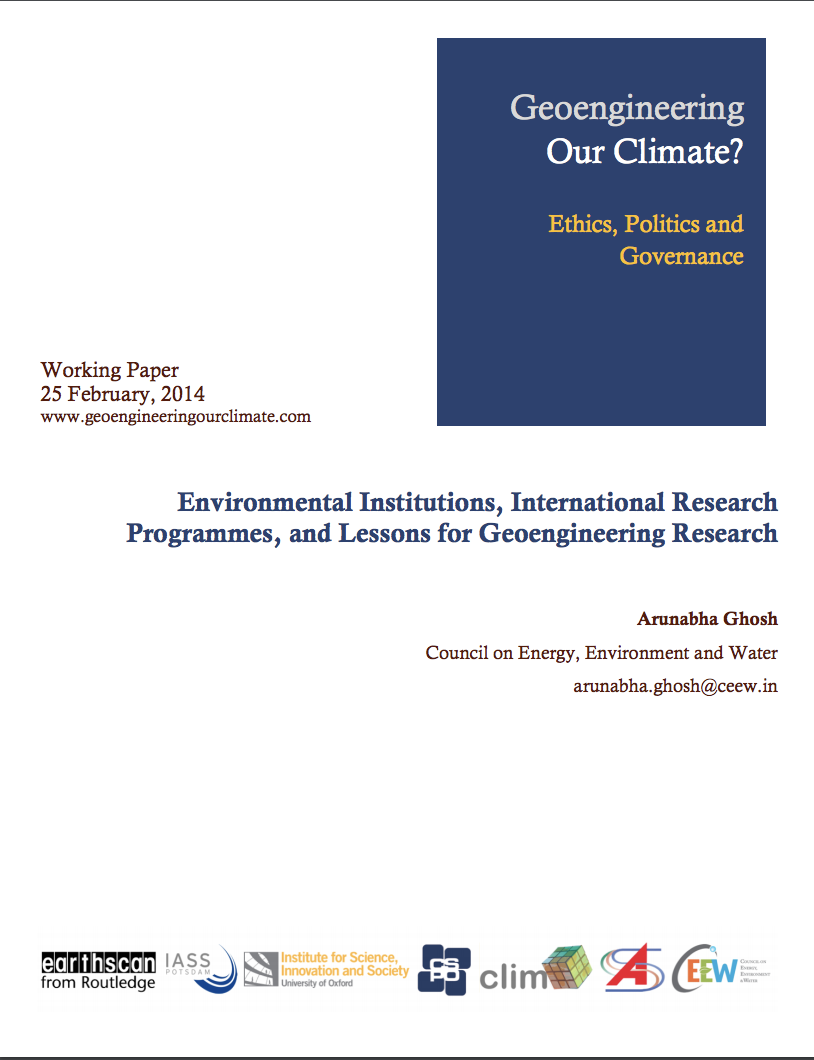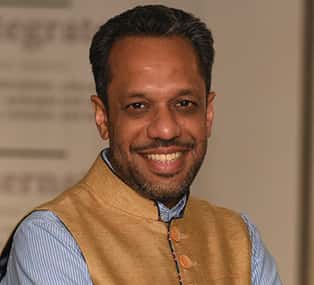Paper
Environmental Institutions, International Research Programmes, and Lessons for Geoengineering Research
Arunabha Ghosh
February 2014 |
Suggested citation: Ghosh, Arunabha. 2014. "Environmental Institutions, International Research Programmes, and Lessons for Geoengineering Research. In Geoengineering Our Climate.. Available at: http://wp.me/p2zsRk-av
Overview
This working paper explores the ethics, politics, and governance of geoengineering. It argues that, given the nature of research, funding requirement, political imperatives and the need to win informed public acceptance, internationally coordinated geoengineering research programmes would be necessary. It highlights examples from previous international research programmes to argue that several key characteristics such as inclusiveness, transparency and review, public engagement, and precaution define successful research endeavours. It also discusses the operational aspect of international research programmes namely research capacity, flexible funding, establishing liability, and intellectual property. The paper demonstrates that although several multilateral environmental treaties might have some relevance to geoengineering, there is still a governance gap when it comes to research.
Key Highlights
- The principles affecting the governance of geoengineering will depend on its categorisation. There are international dimensions of geoengineering which includes computer modelling, field experiments, and deployment.
- Process legitimacy will depend on how inclusive procedures are for decision making, review and dispute settlement. Outcome legitimacy will depend on how voting rights are determined, the quality of reporting and the ability to enforce decisions.
Lessons from other international research programmes
- World Climate Research Program: It aims to improve scientific understanding of the earth’s physical climate system and studies the global atmosphere, oceans, sea ice, land ice, and the land surface. It regularly informs the UN Framework Convention on Climate Change (UNFCCC) and its subsidiaries.
- European Organisation for Nuclear Research: The European Organisation for Nuclear Research (CERN), is the world's largest particle physics laboratory, situated on the Franco-Swiss border. It is run by European countries and has two representatives from each member state, one representing the government and the other the country’s scientific community.
- Nuclear waste management: Nuclear waste management and disposal have benefited from international collaboration. As with geoengineering, these topics raise complex questions about technology, earth science, long-term stewardship, and public engagement.
- Consultative Group on International Agricultural Research: The CGIAR was created to coordinate agricultural research and food security measures that were being employed in several developing countries. It led to the evolution of a network of research institutions, including the International Centre for Tropical Agriculture (CIAT) in Colombia and the International Institute for Tropical Agriculture (IITA) in Nigeria.
Operational aspects of designing international research programmes
- Research quality: Geoengineering research activities will have to devote greater attention to emerging economies and poorer countries by identifying potential institutions that could be drawn into a network of international research collaborations.
- Flexible funding: The transparency of funding channels and the openness of the intellectual property regimes vis-à-vis geoengineering research would be important to ensure that such efforts are rewarded by exclusive patents.
- Responsibility and liability: With many parties involved in research, responsibility for anticipated and unanticipated adverse outcomes has to be ascribed and limits on liability established. For legal agreement, every organisational partner has to agree.
- Intellectual property: Every country has different rules and there are ethical questions about whether research conducted in the public interest should be commercialised on a private basis, therefore Intellectual property rights in international research programmes are controversial.
- Access to data:Climate change threatens humanity and the impacts of geoengineering are expected to be of a transboundary scale. Therefore, the case of publicly available data is strengthened. Government-funded research should remain in the public domain, while privately funded work should have limits on proprietary knowledge.
The challenge with geoengineering research on an international scale is not merely the coordination of the efforts, but developing cooperative mechanisms that reduce uncertainties, increase trust and are legitimate in the eyes of people and countries that are left outside of the process.





